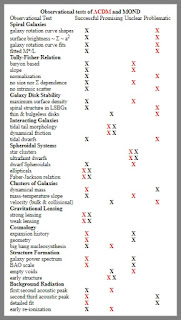Advice
of Han Solo to Luke Skywalker, Star Wars Episode IV: A New Hope
Cosmologist
Ethan Siegel seems to enjoy serving as a kind of ideological
stickler. Call him Ethan the Enforcer. Siegel fervently wants you to
conform to whatever speculative dogmas are popular among his fellow
cosmologists, whether it be the theory of dark matter or Guth's
theory of a short burst of cosmic inflation at the dawn of time.
Showing great overconfidence (like many of his fellow scientists), Siegel often speaks as if the cases
for such speculations are slam-dunks, even though there is no strong
case for either of these speculations. The things typically claimed
as evidence for dark matter are mainly just things suggesting “something
else,” some unknown reality, rather than dark matter specifically.
Sometimes
Siegel writes kind of “whip the heretics” posts such as his
recent post “There's A Debate Raging Over Whether Dark Matter Is
Real, But One Side Is Cheating.” Siegel's purpose in this post is
to demand compliance and conformity in regard to the speculative
dogma of dark matter. He attempts to verbally flog those who prefer
alternative theories, such as the theory of MOND (Modified Newtonian
Dynamics), accusing such people of “cheating.” But he does
nothing to substantiate such a claim.
Rather
than assuming there are vast amounts of invisible dark matter, MOND
theorists simply speculate that the laws of gravity are more complicated than Newton or Einstein assumed. Speaking of MOND
versus dark matter, Siegel tells us that “Among cosmologists, there
is no debate, because there is no alternative to dark matter that
reproduces the observed successes.” This statement is false, and
also clumsily enough contradicts the title of Siegel's post. There is
indeed such a debate, and some cosmologists (such as those supporting
MOND theories) don't believe in the dark matter theory. Siegel's
untruth here is standard fare for ideological enforcers, who often
take the tactic of exaggerating the popularity of whatever orthodoxy
they are defending, while trying to sweep heretics and dissenters
under the rug.
Siegel gives us this narrative about dark matter:
What's
most impressive is that the predictions of dark matter were first
made in the 1970s and 1980s, and were observationally confirmed
later. This is not a case of tweaking the model to fit the data; this
is a case of the best kind of science you hope for: where you make
predictions, make the observations, and what you see validates and
confirms the predictions you had made.
Such
claims are rather amusing. Of course, the “best kind of science you
can hope for” is when you directly observe something that you
postulated before observing it (such as when Dirac predicted
antimatter before it was discovered). But nothing like that has
happened in regard to dark matter, which has never been directly
observed, and which has no place in the Standard Model of Physics.
As for predictions, theorists have been constantly fiddling with dark
matter theoretical models over the past few decades to try to get
them to fit observations, and there is still a large degree of
discrepancy between observations and such models, particularly in
regard to satellite galaxies.
Andromeda galaxy and one of its satellite galaxies (credit: NASA)
In
his zeal to flog his ideological opponents, Siegel fervently tells
us, “It's only if you ignore all of modern cosmology that the
modified gravity alternative looks viable.” For a cosmologist to
accuse other cosmologists of ignoring all of modern cosmology is an
example of heated rhetorical excess that will not persuade anyone
that Siegel is coolly and calmly pondering this weighty topic.
Below
is a table found on the “Mond Pages” website defending MOND
cosmology. The table compares the dark matter theory (shown in red)
to the rival MOND theory. According to the author, the MOND theory actually
holds up to observations better than the dark matter theory. The
MOND theory seems better at predicting smaller scale reality (such as
the situation around our galaxy and its satellites). The dark matter
theory works better only on the largest scales. In his post Siegel
trumpets the better performance of dark matter theory on the largest
scales, neglecting to tell his readers about all the many ways in
which the MOND theory outperforms the dark matter theory, particular
at smaller scales.
Siegel's
claim of cheating is based on the flimsy complaint that the MOND
theorists aren't being honest about how dark matter theory works
better at the largest scale. But, to the contrary, in the diagram
above a MOND theorist seems to candidly admit that this is where dark
matter theory does better (in the rows at the end of this table). No
sign of any cheating going on here.
In
this interview, a MOND supporter lists many problems with the dark
matter theory. He states the following (using the acronym LCDM to
refer to the dark matter theory) :
In this post, the same person states that the search for dark matter has become a "quagmire of confirmation bias." If so, it isn't the only such quagmire on the landscape of science academia.



No comments:
Post a Comment